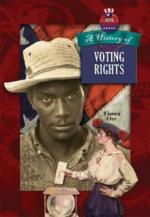July 12, 2016 | Thorndyke
Hey Kids,
I hope everyone had a safe and fun Independence Day. Did you know that it’s an election year? That means that citizens of voting age have the chance to make their voices heard. Some voters will also choose their governors, or vote on laws. Not everyone has always been able to vote, however. There are many stories of people who fought to have the right to vote. I’ve included a few below. During the summer you can make your voice heard at our Decision 2016 station in the Connect Your Summer command center. You can also see who currently represents you.
Bear Hugs,
Thorndyke
Looks at the history of voting rights in the United States, examining the struggles of African Americans, Native Americans, and women to have the right to vote.
Sisters Abby and Julia Smith attract the attention of women's suffrage supporters across the country when they refuse to pay property taxes on their cows because they are not allowed to vote--a case they say is taxation without representation.
As an elderly woman, Lillian recalls that her great-great-grandparents were sold as slaves in front of a courthouse where only rich white men were allowed to vote, then the long fight that led to her right--and determination--to cast her ballot since the Voting Rights Act gave every American the right to vote.
Recounts the suffragist Susan B. Anthony's first trip to the ballot box on November 5, 1872, her subsequent arrest, and trial.
Presents a collage-illustrated treasury of poems and spirituals inspired by the life and work of civil rights advocate Fannie Lou Hamer.
Chronicles the history of women's suffrage, highlighting the contributions of Elizabeth Cady Stanton and such other reformers as Sojourner Truth, Susan B. Anthony, and Lucy Stone.
Explores the origin, meaning, and importance of the Declaration of Independence, the Constitution, and the Bill of Rights.
Presents the life and accomplishments of the first female doctor in the United States who served on the Union side in the Civil War and was awarded the Medal of Honor for her service.
In 1869, a woman whose "can-do" attitude had shaped her life was instrumental in making Wyoming the first state to allow women to vote, then became the first woman to hold public office in the United States.
Presents an account of the 1965 civil rights march from Selma to Montgomery, Alabama, an event that sparked the signing of the Voting Rights Act.











